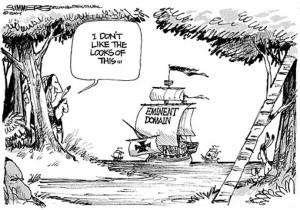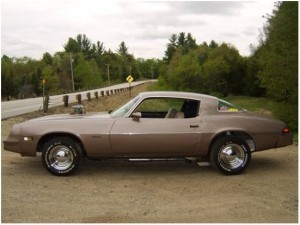|
Retire Early
Lifestyle
Retirement; like your parents, but way cooler

|
In 1991 Billy and Akaisha Kaderli retired at the age
of 38. Now, into their 4th decade of this
financially independent lifestyle, they invite you
to take advantage of their wisdom and experience. |
|
Why Your
House Is a Terrible Investment
Jim Collins writes about his passion for travel and the investing strategies
that support it. His Blog is best known
for describing the importance of accumulating F-you Money and the
Stock Series posts on
investing for it.
My pal James Altucher calls home ownership
a part of The American Religion, so I know I’m treading dangerous ground here.
But before you get out the tar and feathers, let’s do a little thought
experiment together.

Imagine over a cup or coffee or a glass of
wine we get to talking about investments. Then maybe one of us, let’s say you,
says:
“Hey I’ve got an idea. We’re always talking
about good investments. What if we came up with the worst possible investment we
can construct? What might that look like?”
Well, let’s see now (pulling out our lined
yellow pad), let’s make a list. To be really terrible:
It should be not just an initial, but
if we do it right, a relentlessly ongoing drain on the cash reserves of the
owner.
It should be illiquid. We’ll make it
something that takes weeks, no – wait – even better, months of time and effort
to buy or sell.
It should be expensive to buy and
sell. We’ll add very high transaction costs. Let’s say 5% commissions on the
deal, coming and going.
It should be complex to buy or sell.
That way we can ladle on lots of extra fees and reports and documents we can
charge for.
It should generate low returns.
Certainly no more than the inflation rate. Maybe a bit less.
It should be leveraged! Oh, oh this
one is great! This is how we’ll get people to swallow those low returns. If the
price goes up a little bit, leverage will magnify this and people will convince
themselves it’s actually a good investment! Nah, don’t worry about it. Most will
never even consider that leverage is also very high risk and could just as
easily wipe them out.
It should be mortgaged! Another
beauty of leverage. We can charge interest on the loans. Yep, and with just a
little more effort we should easily be able to persuade people who buy this
thing to borrow money against it more than once.
It should be unproductive. While
we’re talking about interest, let’s be sure this investment we are creating
never pays any. No dividends either, of course.
It should be immobile. If we can fix
it to one geographical spot we can be sure at any given time only a tiny group
of potential buyers for it will exist. Sometimes and in some places, none at
all.
It should be subject to the fortunes
of one country, one state, one city, one town…No! One neighborhood! Imagine if
our investment could somehow tie its owner to the fate of one narrow location.
The risk could be enormous! A plant closes. A street gang moves in. A government
goes crazy with taxes. An environmental disaster happens nearby. We could have
an investment that not only crushes it’s owner’s net worth, but does so even as
they are losing their job and income.
It should be something that locks its
owner in one geographical area. That’ll limit their options and keep ’em docile
for their employers!
It should be expensive. Ideally we’ll
make it so expensive that it will represent a disproportionate percentage of a
person’s net worth. Nothing like squeezing out diversification to increase risk.
It should be expensive to own, too.
Let’s make sure this investment requires an endless parade of repairs and
maintenance without which it will crumble into dust.
It should be fragile and easily
damaged by weather, fire, vandalism and the like. Now we can add-on expensive
insurance to cover these risks. Making sure, of course, that the bad things
that are most likely to happen aren’t actually covered. Don’t worry, we’ll bury
that in the fine print or maybe just charge extra for it.
It should be heavily taxed, too.
Let’s get the Feds in on this. If it should go up in value, we’ll go ahead and
tax that gain. If it goes down in value should we offer a balancing tax
deduction on the loss like with other investments? Nah.
It should be taxed even more! Let’s
not forget our state and local governments. Why wait till this investment is
sold? Unlike other investments, let’s tax it each and every year. Oh, and let’s
raise those taxes anytime it goes up in value. Lower them when it goes down?
Don’t be silly.
It should be something you can never
really own. Since we are going to give the government the power to tax this
investment every year, “owning” it will be just like sharecropping. We’ll let
them work it, maintain it, pay all the cost associated with it and, as long as
they pay their annual rent (oops, I mean taxes) we’ll let ’em stay in it. Unless
we decide we want it.
For that, we’ll make it subject to
eminent domain. You know, in case we decide that instead of getting our rent
(damn! I mean taxes) we’d rather just take it away from them.

Here are two more offered by readers…
Mr. Risky Start-up: It should
increase stress, lead to more divorces, but then be impossible to divide.
DMDave: You only need one motivated
(read: desperate) seller to set the price for the whole neighborhood. Imagine
your so-called “investment” suddenly get scuttled when your neighbor decided to
sell his particle-board mansion at 20% below assessment.
Boy howdy! That’s quite a list! Any
investment that ugly would make my skin crawl. In fact, I’m not sure you could
rightly call anything with those characteristics an investment at all.
Then, too, the challenge would be to get
anybody to buy this turkey. But we can. In fact, I bet we can get them not only
to buy but to believe doing so is the fulfillment of a dream, indeed a national
birthright.

A few weeks back I was at an awards
banquet and sitting at our table was a woman I know. She began talking about how
she was encouraging her young son to buy a house. You know. Stop throwing away
money on rent and start building equity.
I suggested that, since her son was single,
living alone and without children maybe he didn’t actually need a house. That if
he didn’t need one, maybe he should consider some alternatives instead. Or at
least run the numbers first.
This didn’t sit well and it was a short
conversation. It ended when she said, “Well, he’d be better off buying a house
than a clapped-out Camaro!”
Well, yeah. Maybe so. If this is the only
alternative.



Retire
Early Lifestyle appeals to a different
kind of person – the person who prizes their
independence, values their time, and who doesn’t
want to mindlessly follow the crowd.
HOME
Book Store
Retire Early Lifestyle Blog
About Billy & Akaisha
Kaderli
Press
Contact
20 Questions
Preferred
Links
Retirement
Country Info
Retiree
Interviews
Commentary
REL
Videos
|